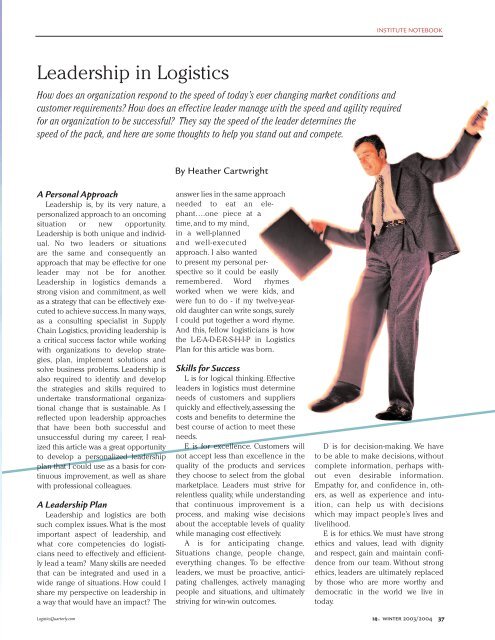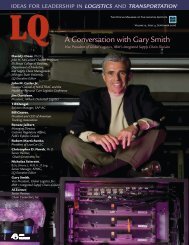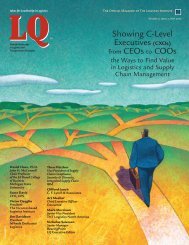Reverse Logistics - Logistics Quarterly
Reverse Logistics - Logistics Quarterly
Reverse Logistics - Logistics Quarterly
You also want an ePaper? Increase the reach of your titles
YUMPU automatically turns print PDFs into web optimized ePapers that Google loves.
Leadership in <strong>Logistics</strong><br />
How does an organization respond to the speed of today’s ever changing market conditions and<br />
customer requirements? How does an effective leader manage with the speed and agility required<br />
for an organization to be successful? They say the speed of the leader determines the<br />
speed of the pack, and here are some thoughts to help you stand out and compete.<br />
A Personal Approach<br />
Leadership is, by its very nature, a<br />
personalized approach to an oncoming<br />
situation or new opportunity.<br />
Leadership is both unique and individual.<br />
No two leaders or situations<br />
are the same and consequently an<br />
approach that may be effective for one<br />
leader may not be for another.<br />
Leadership in logistics demands a<br />
strong vision and commitment, as well<br />
as a strategy that can be effectively executed<br />
to achieve success.In many ways,<br />
as a consulting specialist in Supply<br />
Chain <strong>Logistics</strong>, providing leadership is<br />
a critical success factor while working<br />
with organizations to develop strategies,<br />
plan, implement solutions and<br />
solve business problems. Leadership is<br />
also required to identify and develop<br />
the strategies and skills required to<br />
undertake transformational organizational<br />
change that is sustainable. As I<br />
reflected upon leadership approaches<br />
that have been both successful and<br />
unsuccessful during my career, I realized<br />
this article was a great opportunity<br />
to develop a personalized leadership<br />
plan that I could use as a basis for continuous<br />
improvement, as well as share<br />
with professional colleagues.<br />
A Leadership Plan<br />
Leadership and logistics are both<br />
such complex issues.What is the most<br />
important aspect of leadership, and<br />
what core competencies do logisticians<br />
need to effectively and efficiently<br />
lead a team? Many skills are needed<br />
that can be integrated and used in a<br />
wide range of situations. How could I<br />
share my perspective on leadership in<br />
a way that would have an impact? The<br />
<strong>Logistics</strong><strong>Quarterly</strong>.com<br />
By Heather Cartwright<br />
answer lies in the same approach<br />
needed to eat an elephant….one<br />
piece at a<br />
time, and to my mind,<br />
in a well-planned<br />
and well-executed<br />
approach. I also wanted<br />
to present my personal perspective<br />
so it could be easily<br />
remembered. Word rhymes<br />
worked when we were kids, and<br />
were fun to do - if my twelve-yearold<br />
daughter can write songs, surely<br />
I could put together a word rhyme.<br />
And this, fellow logisticians is how<br />
the L-E-A-D-E-R-S-H-I-P in <strong>Logistics</strong><br />
Plan for this article was born.<br />
Skills for Success<br />
L is for logical thinking. Effective<br />
leaders in logistics must determine<br />
needs of customers and suppliers<br />
quickly and effectively,assessing the<br />
costs and benefits to determine the<br />
best course of action to meet these<br />
needs.<br />
E is for excellence. Customers will<br />
not accept less than excellence in the<br />
quality of the products and services<br />
they choose to select from the global<br />
marketplace. Leaders must strive for<br />
relentless quality, while understanding<br />
that continuous improvement is a<br />
process, and making wise decisions<br />
about the acceptable levels of quality<br />
while managing cost effectively.<br />
A is for anticipating change.<br />
Situations change, people change,<br />
everything changes. To be effective<br />
leaders, we must be proactive, anticipating<br />
challenges, actively managing<br />
people and situations, and ultimately<br />
striving for win-win outcomes.<br />
INSTITUTE NOTEBOOK<br />
D is for decision-making. We have<br />
to be able to make decisions, without<br />
complete information, perhaps without<br />
even desirable information.<br />
Empathy for, and confidence in, others,<br />
as well as experience and intuition,<br />
can help us with decisions<br />
which may impact people’s lives and<br />
livelihood.<br />
E is for ethics. We must have strong<br />
ethics and values, lead with dignity<br />
and respect, gain and maintain confidence<br />
from our team. Without strong<br />
ethics, leaders are ultimately replaced<br />
by those who are more worthy and<br />
democratic in the world we live in<br />
today.<br />
LQ winter 2003/2004<br />
37







